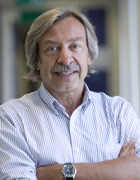Professor Adrian Hayday elected to the fellowship of the Royal Society
 Professor Adrian Hayday from the Division of Immunology, Infection & Inflammatory Disease in the Faculty, has been elected to the fellowship of the Royal Society, the UK's national academy of science. 50 Fellows are elected each year in recognition of their exceptional contributions to science, engineering and medicine.
Professor Adrian Hayday from the Division of Immunology, Infection & Inflammatory Disease in the Faculty, has been elected to the fellowship of the Royal Society, the UK's national academy of science. 50 Fellows are elected each year in recognition of their exceptional contributions to science, engineering and medicine.
Adrian Hayday trained in biochemistry at Cambridge, and was awarded a PhD in molecular virology by Imperial College London. He began studying immunology in 1982 at M.I.T., where he identified the molecular basis of oncogene activation in Burkitts Lymphoma. Thereafter, he first described the genes defining gamma-delta T cells, an evolutionarily conserved yet wholly unanticipated set of lymphocytes. At Yale and then at King’s College London and the Francis Crick Institute, Professor Hayday established that gamma-delta T cells are distinct from other T cells, commonly monitoring body-surface integrity rather than specific infections. Their rapid responses to tissue dysregulation offer protection from carcinogenesis, underpinning Professor Hayday’s and others’ ongoing initiatives to employ the cells for immunotherapy.
Professor Hayday said of his appointment: "I am conscious that it is a privilege to undertake pure "discovery science" and to pass on the insights gained by teaching and through clinical application. Our determination to pursue our curiosity about how immune cells function at body surfaces has been greatly supported by King's and the Crick, by Cancer Research UK and the Wellcome Trust; and by Yale University before that. In all these regards, I am fortunate to have been able to work with terrifically talented and dedicated young scientists and many outstanding collaborators. What progress we've been able to make is due to them."
Venki Ramakrishnan, President of the Royal Society, said: “Science is a way of understanding both the world around us and ourselves. It is one of the great triumphs of human achievement and has contributed hugely to our prosperity and health. Science will continue to play a crucial role as we tackle some of the great challenges of our time including food, energy, health and the environment. The scientists elected to the Fellowship are leaders who have advanced their fields through their ground breaking work. We are delighted to welcome them to the Royal Society.”
The Fellowship of the Royal Society is made up of the most eminent scientists, engineers and technologists from or living and working in the UK and the Commonwealth. Past Fellows and Foreign Members have included Isaac Newton, Charles Darwin, Albert Einstein and Stephen Hawking. You can view the full list of Fellows on the Royal Society website.